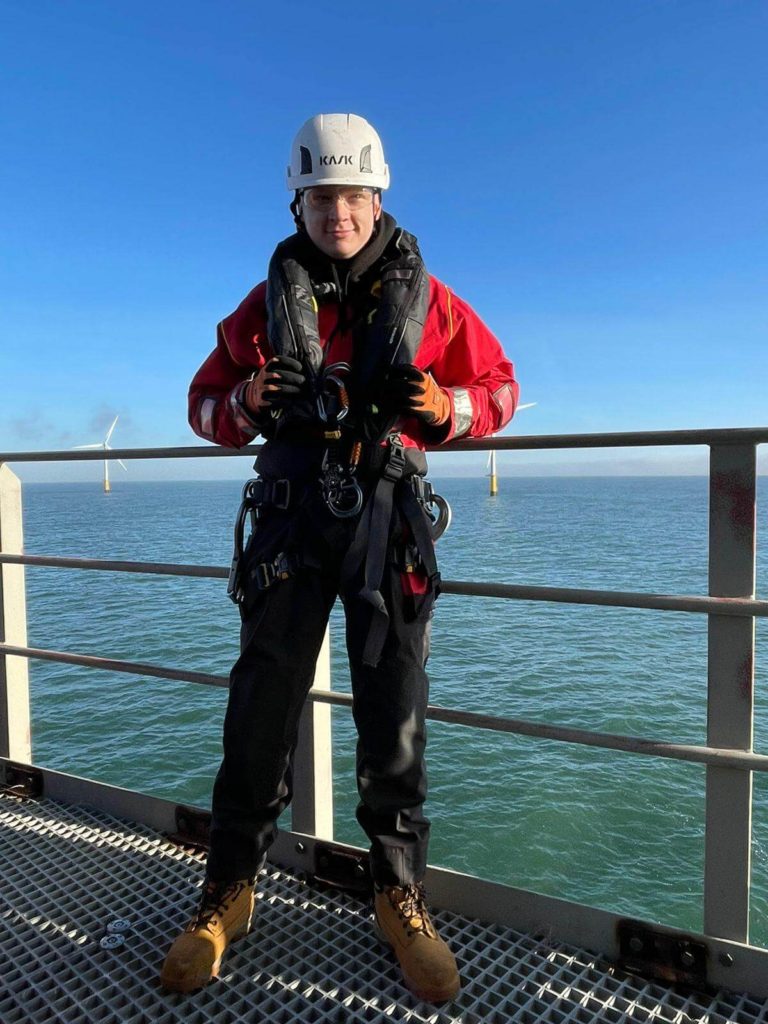



Nathan Emmet, Engineering Fitter Apprentice is already experiencing first-hand what Correll technicians do for some of the biggest renewable energy operators onshore and offshore.
Here Nathan gives us an overview on “The day in the life of a trainee engineer”.
What attracted you to Correll and the Offshore Wind Farm Industry?
I had been looking for an apprenticeship for quite some time before I decided to start studying electrical engineering at university.
When I received the information about an apprenticeship opportunity at Correll I was very excited to apply as I already had a keen interest in offshore engineering, particularly the design and maintenance of Wind Turbines.
Following on from several interviews and communication I was offered the position of an engineering fitter apprentice, and started at Correll on the 1st November 2021 where I was made to feel welcome by the team and got to know everyone very fast.
Training and support: what did you enjoy and what support and guidance did you receive to help you understand the scope of the tasks?
Soon into the apprenticeship we were informed on all of the key aspects of our job roles. We were given a lot of PPE, and were made sure that we were happy with all of the items before being taken into the workshop to be shown how to correctly use the test machines and learn about the different types of cables and fibre optics.
We also began assisting in putting projects together, this consisted of preparing FO and HV toolboxes and kitbags for the offshore team, and the loading and unloading of the trucks.
This helped massively, as when I was offshore it gave me an insight into what the correct tools are and how they are used for different tasks.

Describe your experience in joining a project for the first time?
My first offshore project was off the coast of Holland on the Prinses Amalia Offshore Wind Park, where an inter array cable replacement was required.
I travelled to Holland by ferry with my work colleagues and was made sure I was fully confident and had all of the necessary things I needed such as thermal clothing and accessories etc. I also completed an online induction specific to the project.
When I arrived in Holland, we drove to Ijmuiden, a small port city in the Dutch province of North Holland where we stayed for 5 nights before transferring to the W2W vessel where we would sleep for the duration of the project.
Prior to starting any works, the Tower Team jointly completed a tool box talk to identify any risks, how we mitigate or reduce the risks, and any relevant controls that we must put in place prior to commencing the works
In the first five shifts we had to travel to the turbines by CTV which is a small crew transferring boat that takes you to and from shore. I was fully made aware that the journey could be choppy, however I was fine with the aid of sea sickness tablets.
When I arrived at the tower the water was fairly calm which meant we could climb. We had to put on all of our PPE including life jackets, harness, gloves, survival suit, helmet and glasses/eye protection. This is to ensure 100% safety when climbing a tower.
I had no problems in climbing as my GWO Working at Height and BOSIET Offshore Survival courses that I attended as part of my training at Correll helped me a lot, giving me an understanding and practice of the safety measures in place when working offshore.
The time that I spent on the turbines was very useful as it allowed me to put my experience in the workshop into practice on the real thing. I had a great deal of support from my colleagues and everyone involved in the project and I learnt so much.
What you would like to do next?
In the long-term, I would like to further expand my knowledge on both High Voltage & Fibre Optic Electrical Engineering as this will help me to better understand the majority of the projects Correll work on offshore.
Correll have been very helpful in allowing me to understand everything by slowing down the process to show the apprentices how things work and the correct procedures, making me feel very comfortable while gaining valuable skills and knowledge.
What advice would you give another young apprentice if offered the same opportunities that you have received?
I would highly recommend an apprenticeship, especially with Correll.
Correll provide trainees with as much support as needed, they also make you feel comfortable to ensure that your knowledge develops in order to be able to work offshore and put your practice into the real work.
The advice that I would give to someone who wants to work in the offshore industry is to make sure that you listen and understand all of the things you are shown. Use all of the skills that you are shown from the various courses that you will attend during your apprenticeship, and when the opportunity comes up for you go offshore then remember all of your training. You will always be guided by the other employees, so if there’s anything you feel uncomfortable with you will be supported with that and everything else that you do.
